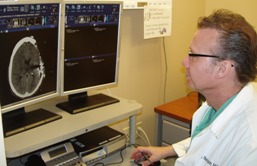Neurocritical Care
 The Neurosurgical Intensive Care Unit (Neuro ICU) at University of Colorado Hospital (UCH) is a regional referral center, and the only dedicated neurocritical care unit in the Rocky Mountain region. It is staffed twenty four hours per day with highly specialized nurses and directed by three fellowship-trained neurocritical care specialists who are board certified by both United Council for Neurologic Subspecialties (UCNS) and Committee on Advanced Subspecialty Training (CAST). The 24-bed Neuro ICU has over 1,300 admissions to our Neurosurgical ICU last year we cater to those patients who need highly specialized, multi-disciplinary care.
The Neurosurgical Intensive Care Unit (Neuro ICU) at University of Colorado Hospital (UCH) is a regional referral center, and the only dedicated neurocritical care unit in the Rocky Mountain region. It is staffed twenty four hours per day with highly specialized nurses and directed by three fellowship-trained neurocritical care specialists who are board certified by both United Council for Neurologic Subspecialties (UCNS) and Committee on Advanced Subspecialty Training (CAST). The 24-bed Neuro ICU has over 1,300 admissions to our Neurosurgical ICU last year we cater to those patients who need highly specialized, multi-disciplinary care.
Under the leadership of Robert T. Neumann MD, PhD along with Luis Cava, MD., Josh Seinfeld, MD, Dave Case, MD, and Wayne Gluf, MD, the practice has evolved to a leading subspecialty at UCH. As recipients of a Gold Beacon Award by the American Association of Critical-Care Nurses, the Neuro ICU team is recognized for excellence in sustained performance and patient outcomes. The Neuro ICU team works seamlessly with Neurosurgical, Neurological, Interventional Radiology, General Surgery, Trauma, and Pulmonary and Internal Medicine specialties on a daily basis. The Neuro ICU provides all types of invasive and non-invasive cardiopulmonary, renal, and neurological life-support and monitoring. The technological advancements in the Neuro ICU provide the clinician, patient, and family with options and answers effecting quality of life.
The Neuro-Intensive Care Unit offers a Neurocritical Care Fellowship through both UCNS and CAST.
The Neuro ICU treatment team is dedicated to the advancement of neuro-critical clinical care. To this cause, the Neuro ICU attending physicians serve as Principal and Co-Investigators on multiple research projects, in both translational and clinical nervous system research. Included in these endeavors are: 1) evaluation of an in-series device that functions as a positive-end expiratory pressure relief valve, to augment cerebral circulation in ventilated patient with intracranial pressure monitoring; 2) evaluation of head positioning in acute stroke; 3) evaluation of the role of arginine deficiency in immune dysfunction following neurologic injury; 4) evaluation of non-invasive devices for early diagnosis of brain injury (including concussion), blood clot formation, and heparin-induced thrombocytopenia; 5) development of national standards for use of novel, FDA-approved neuro-critical care devices and therapeutics; and 6) advancing neural-grafting science.